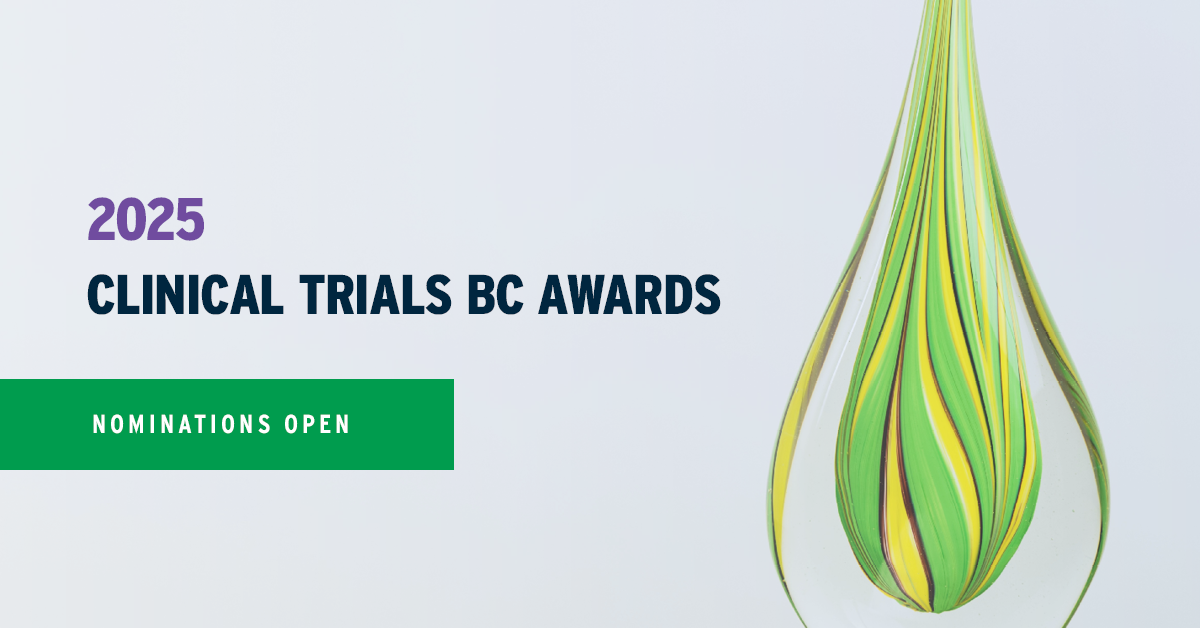Partnerships boost next generation of BC’s neuroscience researchers
24 January 2023

Along with our partners, Michael Smith Health Research BC is co-funding exceptional research talent who are giving hope to people living with neurological diseases and disorders.
Strong partnerships are fostering world-class health research in British Columbia. Our goal is to optimize investments in health research that improve the health of the people and communities across the province. To achieve this, our partnership strategy advances shared priorities in three focus areas: developing BC’s health research talent, building health research capacity across the province, and advancing research of high value to the health system.
Health Research BC’s partnerships have grown rapidly. Since 2014, our funding partners have quadrupled to 50 and our partnered awards have increased more than five times. We have co-invested over $56 million in health research that is advancing partner priorities related to discovery, treatments, cures, and care delivery.
The benefits for our partners include a thorough peer review process, efficiency, broad reach, and ultimately, greater impact for partners’ donor dollars.
Through partnerships, we are enabling and strengthening a growing body of cutting-edge research in specialty areas across the province to improve patient care and outcomes. In this article, we shine the spotlight on partnerships in neuroscience research.
We partner with non-profit organizations dedicated to helping patients with neuro-related diseases and disorders including the BC Schizophrenia Society Foundation, Canadians for Leading Edge Alzheimer Research (CLEAR Foundation formerly known as Pacific Alzheimer Research Foundation), Parkinson Society British Columbia, and Pacific Parkinson’s Research Institute. Together, we have co-funded 29 partner awards through our Research Trainee, Scholar, Health Professional-Investigator, and Innovation to Commercialization Programs.
“By joining forces with Health Research BC, we are part of a province-wide organization that is tackling some of the most challenging health problems in our world today,” says Renato Zane, chair, BC Schizophrenia Society Foundation. “We can use that incredible leverage to attract more donations for our cause.”
The way of the future
As a volunteer-run organization, Pacific Parkinson’s Research Institute (PPRI) doesn’t have the necessary know-how and infrastructure to find, assess and fund the best talent across BC.
“Health Research BC has made it easy for us to find the right researchers,” says Rod Scheuerman, past chair of PPRI. “It gives us a geographical reach we didn’t have before. As a Vancouver-based organization, there is no way we would easily find a research project in Victoria without a partnership like this. It is the future for organizations like us.”
Anne Rowland, chair of PPRI, concurs. “Our hopes and aspirations are to put our money to excellent use and know that it is working in the very best way it can for our donors,” says Anne whose mother lived with Parkinson’s for 15 years. “Our purpose is to understand progression, complications of the disease, and ultimately find a cure.”

Rod points to 2019 Michael Smith Health Research BC / Pacific Parkinson’s Research Institute Innovation to Commercialization awardee Dr. Stephanie Willerth whose research is an example of scientific innovation in our own backyard. She is a recognized leader in the fields of biomaterials and tissue engineering and in 2020, she co-founded Axolotl Biosciences based at the University of Victoria.
Stephanie’s team is creating 3D bioprinting that can produce living human tissues on demand, opening up huge possibilities for medical breakthroughs in drug screening and developing replacement tissues. This will improve health outcomes for patients with neurological diseases and disorders.
Stephanie says her partnered award is “unique” because it fills a gap in health research funding in Canada. Funding agencies are hesitant to support relatively new and risky technology like bioprinting. “My partnered award supports people who are taking unconventional approaches to treating neurological diseases,” says Stephanie who also holds a Canada Research Chair.
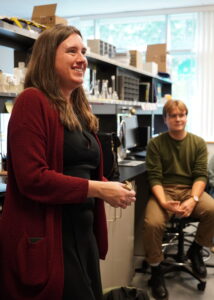
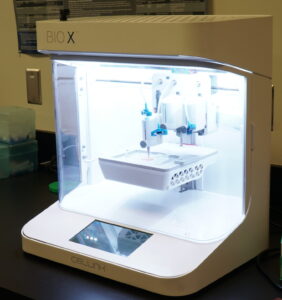
“The partnered funding from Health Research BC and PPRI helped my team develop our technology, and develop it relatively quickly, which is important because existing treatment approaches are limited to addressing symptoms.”
Leveraging strengths to optimize impact
In 2021, the BC Schizophrenia Society Foundation offered ‘gap funding’ for researchers whose ongoing projects were in jeopardy because of the COVID-19 pandemic. While they received many applications, the team of volunteers quickly discovered the demands of managing a research funding competition with scientific and ethical rigour.
“We realized how challenging the field of research is and how unprepared we are to be involved directly in making research-oriented funding decisions,” says Renato. “This reiterated how valuable our partnership with Health Research BC is. They have credibility, and it gives our donors peace of mind because they work with us to be effective and ethical stewards of their donations.”
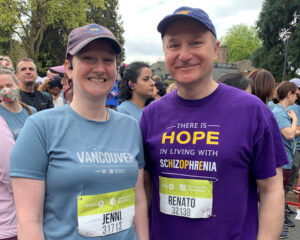
Renato is particularly hopeful about Dr. Rafal Skiba’s (2021 Michael Smith Health Research BC / BC Schizophrenia Society Foundation Research Trainee) work in the area of neuromodulation (alteration or modulation of nerve activity to stimulate response), which can be life-changing. “There is a real possibility that we could become global leaders because we are getting the attention of many key players in the research field,” says Renato.

Rafal moved from Poland to Canada because he was inspired by the internationally renowned neuroscience researchers in BC. Acknowledging the importance of partnered funding, Rafal says sometimes researching one condition could lead to answers for others as well. “Schizophrenia affects one percent of the population, but we can learn more about how the brain works when we study someone with schizophrenia. This knowledge can be very useful not only for treating schizophrenia, but also other neuro diseases,” says Rafal.
Supporting early career researchers crucial to building research capacity in BC
According to Dr. B. Lynn Beattie, director and president of CLEAR Foundation, if not for their funding partnership with Health Research BC, the research landscape for dementia and Alzheimer’s disease in British Columbia would be significantly limited.
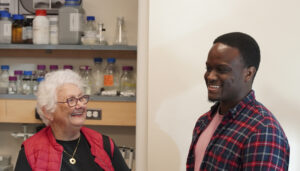
“Funding trainees and scholars is crucial to building research capacity in the province,” says Lynn. Connecting with health researchers and Health Research BC’s peer review process for funding applications, which she “values highly”, are the biggest advantages of the partnership.
Lynn knows the devastating impacts of Alzheimer’s disease from years of clinical practice. Also, several family members have been diagnosed with the condition. While prevention is important, she emphasizes that we also need to research disease modifying treatments. Lynn has seen that by partnering with Health Research BC, CLEAR Foundation has expanded its focus on research that is investigating causes, treatments, and a potential cure for Alzheimer’s disease.
Funding the ‘best of the best’ through rigorous peer review — a big draw
Jean Blake, CEO of Parkinson Society British Columbia, is hopeful.
“Stem cell research in other countries is showing some exciting results,” says Jean. “With Health Research BC, we are supporting researchers who are doing a similar type of research so we are hopeful that this might be an area that could see results sooner rather than later.”

It is crucial for Parkinson Society British Columbia to partner with an organization that has a rigorous peer review process to support people with Parkinson’s and their families through research. “It is important to our Board, who are all volunteers, that our funds are going to the best of the best,” says Jean. “That is a big draw in terms of the partnership.”
Jean further adds that they have “comfort” in knowing that Health Research BC will approach them for co-funding only after a thorough peer review process, which is their “number one requirement”.
These are a few examples of how Health Research BC is working with partners. Together we are optimizing investments in health research that improve the health of the people and communities in British Columbia.
Learn more about partnering with Health Research BC to co-fund research at our Prospective Partners page.



